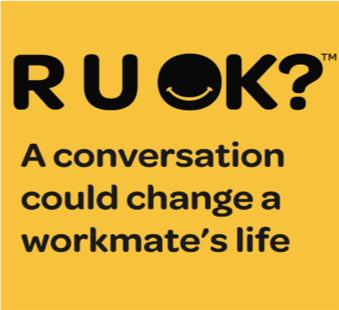There’s more to say after R U OK?
Today is R U OK? Day – an important day for your organisation to initiate conversations about an important but difficult issue that affects Australians across all workplaces.
The theme for this year’s R U OK? Day is ‘There’s more to say after RU OK?’, aimed at educating people what steps to take if someone says they are not OK.
The R U OK? Team says: “You don’t have to be an expert to keep the conversation going when someone says they’re not OK. By knowing what to say you can help someone feel supported and access appropriate help long before they’re in crisis, which can make a really positive difference to their life.”
The approach is straight forward. Ask the simple question of someone whether they are OK, and you start a conversation that may lead to a vulnerable person seeking assistance and potentially prevent suicide.
If you can improve the feeling of connection between people, then the belief is that the risk of harm is reduced. If you are in a position to influence others in your organisation, you can encourage or inspire them to ask “are you ok?” and then to genuinely take the time to listen to the answer.
How to manage mental health in the workplace
Today is a good opportunity to reflect on what steps your organisation is taking to improve mental health in the workplace. And given the COVID-19 pandemic, people are probably under a greater level of stress than ever before.
Even putting COVID-19 to one side, no workplace is completely protected from its workers developing mental health issues. This risk is particularly high if the workplace has had history before the pandemic of:
- poor communication;
- high levels of pressure;
- job insecurity;
- long working hours; or
- bullying.
To manage mental health issues in the workplace, you should ensure that you implement a framework, underpinned by training and good management, that promotes a supportive work environment designed to reduce stress and eliminating bullying.
Steps you can consider include:
- introducing health and wellbeing programs;
- making available a well-resourced Employee Assistance Plan;
- implementing anti-bullying policies and train staff in their operation;
- upskilling your managers to be able to assist workers suffering from stress or mental health issues;
- monitoring health and wellbeing in your organisation through confidential surveys; and
- introducing peer-to-peer support programs.
Your organisation can use campaigns like R U OK? Day to promote health and wellbeing in your workplace. But while a reminder 1 day a year such as R U OK? Day is important, it is critical that you consider how your organisation deals with stress and mental health issues in a holistic manner.
From the experts behind the Health & Safety Handbook, the Bulletin brings you the latest work health and safety news, legal updates, case law and practical advice straight to your inbox every week.

